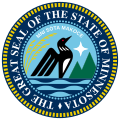Campaign
Klobuchar gained the early endorsement of the majority of DFL state legislators in Minnesota. A poll taken of DFL state delegates showed Klobuchar beating her then closest opponent, Patty Wetterling, 66% to 15%. As of June 30, 2005, Klobuchar had more cash on hand than any other candidate, nearly $1,100,000.
Klobuchar was endorsed by EMILY's List on September 29, 2005. On January 20, 2006, Wetterling dropped out of the race and endorsed Klobuchar. [1]
Former Senate candidate and prominent lawyer Mike Ciresi, who was widely seen as the only other serious potential DFL candidate, indicated on February 7, 2006, that he would not enter the race. That removal of her most significant potential competitor for the DFL nomination was viewed as an important boost for Klobuchar. [2]
The only other serious candidate for the DFL endorsement was veterinarian Ford Bell. Bell, a staunch liberal, ran on a platform of implementing single-payer healthcare and immediate withdrawal from Iraq. [3] Klobuchar won the official DFL endorsement on June 9, 2006. [4] Bell dropped out of the race on July 10, citing inability to compete financially, and also endorsed Klobuchar. [3]








